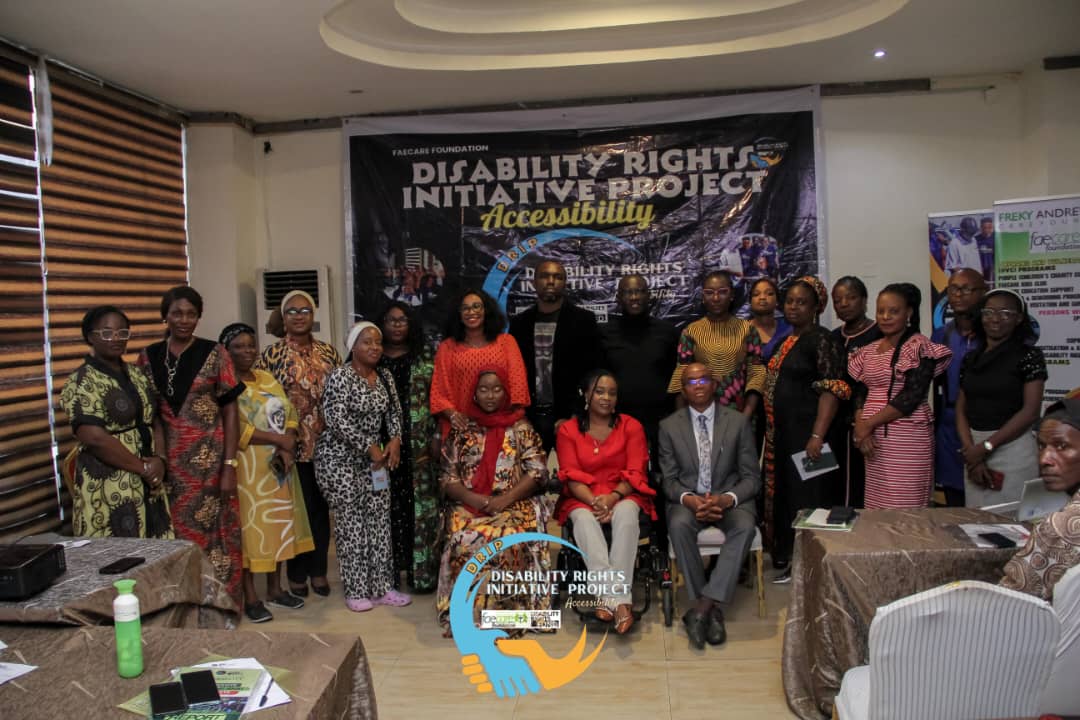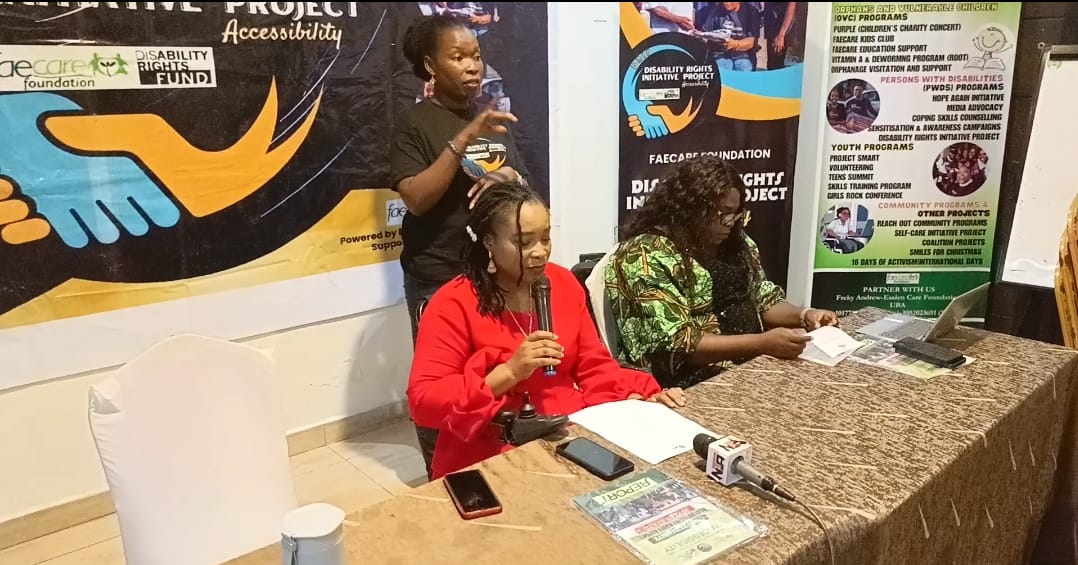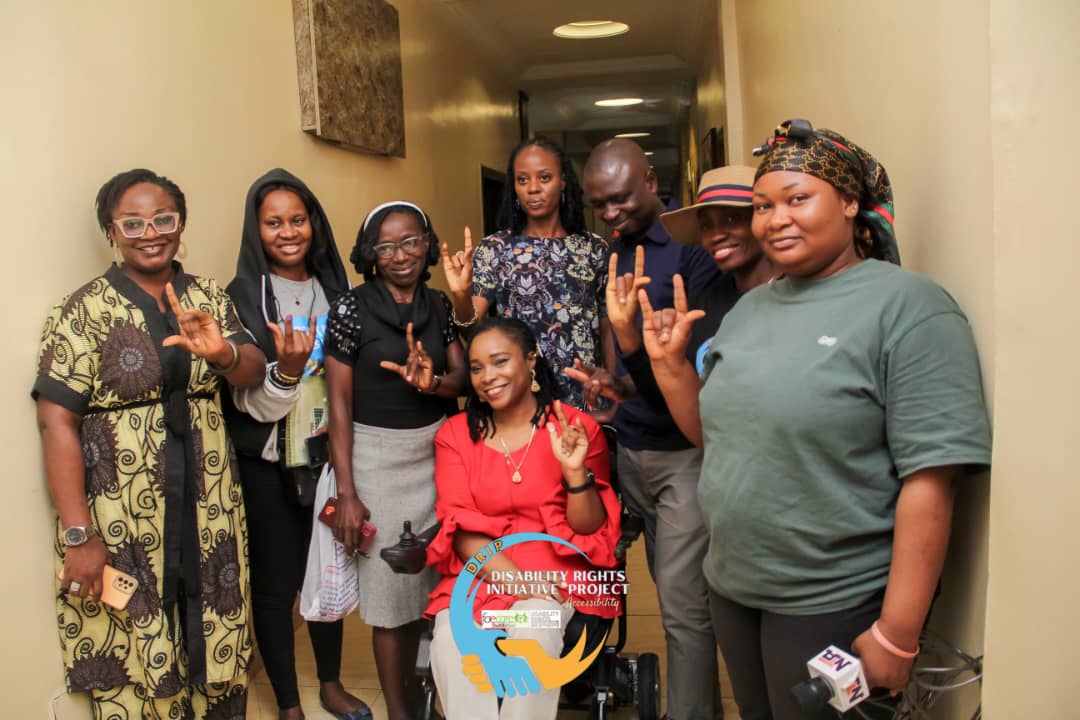


Subject: Advancing Disability Rights in Rivers State: A Call for Accessibility
We extend a warm welcome and heartfelt gratitude to each of you for dedicating valuable time from your busy schedules to join us today. Your presence signifies a profound commitment to advancing the rights of Persons with Disabilities (PWDs) in Rivers State. This gathering is a testament to the importance you place on ensuring that the community of Persons with Disabilities in our state is no longer subject to disenfranchisement and rights violations. Through this press release and roundtable discussion, we aim to raise awareness and advocate for a more accessible state for Persons with Disabilities in Rivers State.
It is with great pride that we introduce Freky Andrew-Essien Care Foundation, well known as FAECARE Foundation. Our organization’s vision is centered on enriching the lives of vulnerable groups within our society, including Orphans and Vulnerable Children, Persons with Disabilities, Youth, and the less privileged. Over the past decade, we have channeled our efforts into bridging the gaps that these groups face. Notably, our focus on empowering Persons with Disabilities, particularly women, has been through diverse initiatives. By fostering social inclusion and lobbying for improved policies, we aim to create lasting positive change. Today, we are here to shed light on one of our key programs.
In our last project, Disability Rights Initiative Project (DRIP), we carried out a comprehensive research endeavor to assess the awareness, knowledge, and attitudes of both Persons with Disabilities and the residents of Rivers State regarding disability rights. The findings reinforced the positive correlation between awareness of disability rights and improved attitudes towards Persons with Disabilities. Participants who had prior interactions with FAECARE Foundation exhibited more positive responses due to their prior understanding of disability rights. Our research also revealed the very limited impact of the Rivers State Persons with Disabilities Welfare (Enhancement) Law of 2012. Largely tied to a non-existent disabilty council and lack of disability rights at its core . Given these circumstances, from this it become imperative to continue to push for the implementation of disability rights in Rivers State holistically and in focus areas.
FAECARE FOUNDATION is currently carrying out a project dubbed Disability Right Initiative Project Accessibility (DRIPA) as the name implies focus is Accessibility. The purpose of the project is to carry out activities that advance the goal to push for accessibility of the physical environment in Rivers state and increase the knowledge of disability rights among persons with disabilities and the public. This crucial project is supported by the Disability Rights Fund (DRF).
Since the inception of this project a few months ago, we have successfully empowered 40 Persons with Disabilities by building their capacity to not only advocate for Disability Rights but also Accessibility. We were able to improve their understanding of disability rights and the legal frameworks designed to protect them. Through a 3-days training, we have equipped them with the skills to advocate for their own rights and those of fellow members within the disability community. This approach highlights the pivotal role of Persons with Disabilities themselves as advocates for change especially Accessibility.
As most know, Nigeria ratified the United Nations Convention on the Rights of Persons with Disabilities (UNCRPD) in March, 2007 with its Optional Protocol in September 2010. In January of 2019 after years of advocacy, the Nigerian Discrimination against Persons with Disabilities (Prohibition) Act was signed into law and is currently in its fifth year. Of course, relevant to us here is the Rivers State Persons with Disabilities Welfare (Enhancement) Law of 2012. A law that we simply must do something about.
In all of these legal frameworks, mentioned as a general principle and pillar of disability inclusion is Accessibility. Accessibility is a cross cutting human rights concern for Persons with Disabilities and it is important that we must begin to address it in all its complexity, encompassing the physical environment, transportation, information and communication, and services. As long as goods, products and services are open or provided to the public, they must be accessible to all.
The rights of persons with disabilities to accessibility, as stipulated by the United Nations Convention on the Rights of Persons with Disabilities (UNCRPD) in Article 9, are not being effectively upheld in our state. This includes the right to access the physical environment and buildings on par with others, emphasizing the importance of creating an inclusive society that enables full and active participation for everyone.
Legislation, such as the Discrimination against Persons with Disabilities (Prohibition) Act, 2018 and the Rivers State Persons with Disability Welfare (Enhancement) Law, 2012, underscores the need for accessibility aids in public buildings. However, implementation and enforcement of these measures remain inadequate, resulting in a persistent lack of progress in making essential spaces accessible.
FAECARE Foundation envisions a Rivers State, where accessibility becomes an integral aspect of societal infrastructure and consciousness. We want to see the identification, resolution, and elimination of barriers hindering accessibility and tangible advancements in accessibility and inclusion for persons with disabilities in the state. Accessibility of the physical environment in Rivers state and increase the knowledge of disability rights among persons with disabilities and the public.
As part of the project, we conducted a comprehensive accessibility audit assessment in Port Harcourt and its environs with the objective to identify common accessibility challenges and recurring issues, prioritize the identified barriers based on their severity and impact.
Across various facets of life we see supported by findings in our accessibility audit that accessibility for persons with disabilities is severely limited and continues to lead to significant activity restrictions, participation barriers, and social exclusion. Details of this will be presented in the next session and copies of the report will be made available.
It is an assortment of experiences that affects a person’s ability to function on an equal basis with others in the society in which he or she lives and one of them is lack of access. And so our stakeholders, champions and allies, we cannot do this alone.
In light of the foregoing, FAECARE Foundation extends the following recommendations:
Legal Framework: Domesticate the Disability Discrimination Prohibition Act or enact a Rights-Based Disability Law in Rivers State.
Establish Disability Council/Commission: Create the Rivers State Disability Council/Commission as a state-funded agency with its own budget.
Advisory Role: Appoint a proactive Special Adviser on Disability Affairs to the Rivers State government.
Public Enlightenment: Conduct a rigorous public enlightenment campaign against the discrimination of persons with disabilities and promote accessibility.
Inclusive Project Design: Ensure that all new state projects and programs incorporate accessibility standards from inception as a policy.
Building Approvals: Prohibit the approval of public building plans that do not meet accessibility standards.
Accessibility Committee: Set up a committee to budget for reasonable accommodation of persons with disabilities.
Infrastructure Modification: Modify infrastructure to enhance physical mobility for all
Professional Training: Provide training such as sign language interpretation for healthcare and education professionals.
Collaboration: Work with civil society and organizations of persons with disabilities to improve communication and digital accessibility, including audio/visual descriptions and close captioning in public media.
Monitoring and Evaluation: Establish a framework/committee to ensure the sustainability of accessibility initiatives and services.
Local Government Strategies: Collaborate with local government and councilors to develop urgent strategies for compliance with accessibility standards.
Government Leadership: Ensure that all government buildings are accessible.
Civil Society
Demand Accountability: Civil society, led by OPDs, should collectively demand accountability from officials on disability affairs.
Inclusive Focus: CSOs should include disability in their programs and collaborate with OPDs and PWDs.
Awareness Campaigns: Increase awareness and inclusivity campaigns.
Increased Funding: Advocate for increased funding to sensitize the public on disability laws and accessibility, utilizing social media, traditional media, conferences, and campaigns.
Public Awareness: Raise awareness among public and social stakeholders through seminars and information campaigns on the rights of persons with disabilities.
Society
Reasonable Adjustments: Make reasonable adjustments to enable persons with disabilities to access products and services.
Awareness: Recognize that disability concerns should be addressed even if they do not directly affect someone you know.
Use Standards: When providing reasonable accommodation, use established standards to ensure usability, such as less steep ramps without landings.
Private Establishments: Ensure that private establishments providing public services are accessible to all.
Increased Awareness: Promote greater awareness of disability and accessibility within the community.
Persons with Disabilities
Collective Action: PWDs in Rivers State must unite to demand and advocate for their rights.
Capacity Building: Develop the capacity to demand rights and push for accessibility improvements.
In conclusion,
We call on all stakeholders, in the public, private and social sector, and growth seeking individuals in Rivers State to prioritize disability rights, ACCESSIBILITY and Disability inclusion in all systems, institutions and the society at large in Rivers State.
Let’s make Rivers State Accessible for all…All means ALL.
Make Rivers State Accessible for Persons with Disabilities too.
Thank you.
Sincerely,
Amb. Ndifreke (Freky) Andrew-Essien
Executive Director
FAECARE Foundation